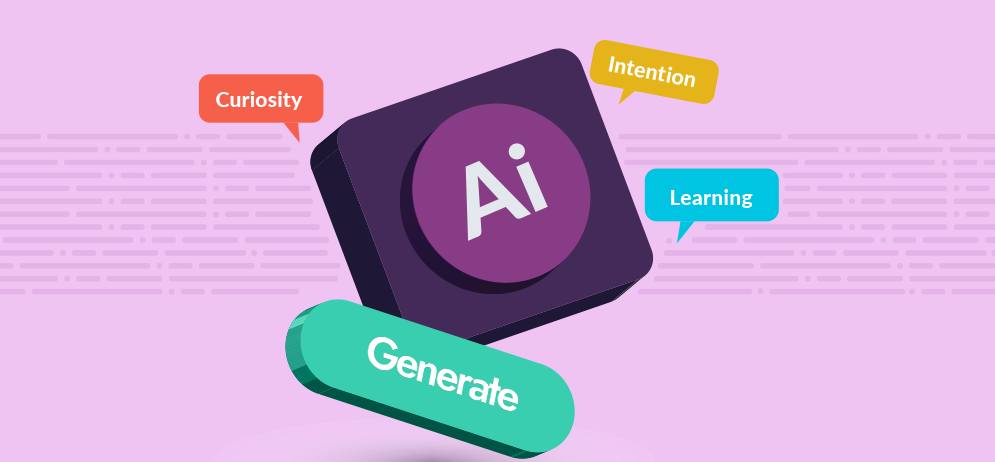It’s no secret that AI is showing up everywhere, especially in K-12 education. From student use in the classroom to lesson planning, it’s already becoming a part of how schools teach, operate, and evolve.
Organizations like ISTE are already outlining what responsible, impactful AI use in schools should look like — especially as new artificial intelligence tools for education emerge.
But while most conversations focus on what AI can do, here’s the question that matters just as much (and maybe even more): Are we preparing our educators to use it well?
The good news? You don’t need an AI-powered platform to get started. What you do need is a smart, flexible approach to supporting educator professional learning — the kind that builds confidence, encourages curiosity, and helps teachers grow into this new era.
So, what’s possible right now? Actually… a lot!
Here are three real ways school and district leaders can start weaving AI into teacher professional development strategies today — without waiting to catch up.
1. Make Your PD Program the Launchpad for AI Learning
AI conversations are already happening in your schools. The question is: are you helping guide them?
Think about it:
- Is your district encouraging teachers to explore AI tools like ChatGPT or Claude?
- Are curriculum teams piloting AI-supported tutoring or intervention tools?
- Are you drafting AI use policies for schools — but haven’t looped your educators into the conversation?
Instead of launching a separate initiative, explore how you may use your professional learning system to track who’s engaging in AI-focused development, tag those activities to AI goals, and build a learning record that shows growth.
PRO TIP: Create a category like “AI Exploration” to support intentional, future-ready educator professional learning.
2. Celebrate Curiosity, Without Losing Focus
AI adoption often starts with curiosity. A teacher experiments with a chatbot for lesson planning. A principal joins a webinar about AI ethics. Someone shares a fun use-case article in the educator Slack channel.
That spark? It’s valuable and worth building on.
With a little structure, you can turn informal exploration into intentional professional learning. You can use Frontline Professional Growth to:
- Approve out-of-district AI trainings and track them alongside in-house PD.
- Deliver custom activities — like your own webinar or article discussion group — through blended formats.
- Share curated content in the Resource Library to keep things consistent and trustworthy.
Remember: It’s about creating space for self-directed learning—without losing sight of what matters most to your district.
3. Start Small, But Start with Intention
Nobody’s asking you to revamp your entire PD program overnight. But if AI is part of your district’s bigger-picture goals this year, it deserves a spot in your professional learning strategy.
You might consider:
- Adding AI-focused reflection prompts to learning journals.
- Running an optional “AI in the Classroom” series — and measure attendance, feedback, and next steps.
- Tracking how AI-related learning aligns with K-12 district priorities like instructional innovation, digital citizenship, or equity.
PRO TIP: Even small moves now can help lay the foundation for bigger educator professional learning initiatives next year – and give you the data to show progress and impact.
Let’s Make It Practical: 4 Takeaways
- Give it a label. Tag AI-related teacher learning activities so they’re easy to find, measure, and reference.
- Start a conversation. Use journaling or team reflections to spark deeper thinking and cross-pollination.
- Let teachers lead. Many are already testing AI tools — give them the spotlight to share what’s working.
- Keep it flexible. Online? Asynchronous? In-person? Make space for different educator needs and schedules.
LOOKING FOR LEGAL INSIGHTS INTO AI IN K-12 PD?
Watch our on-demand webinar with K-12 education law expert Gretchen Shipley to explore policy guidance, risk management, and how districts can lead with confidence.
AI + PD: The Frequently Asked Questions
We know there are still questions — and we’ve got answers. Whether you’re starting small or scaling something bigger, here’s a quick-hit guide to help you take the next step with confidence.
Asking and answering, so you don’t have to.
Q: How can school districts support AI-related training for teachers?
A: Districts can offer AI-aligned professional development through flexible formats like asynchronous modules, in-house webinars, or approved external trainings. You can also track participation and growth using your existing PD tools.
Q: What are examples of AI-focused PD activities?
A: Examples include “AI in the Classroom” discussion groups, ethics workshops, deep dives into ChatGPT use cases, and guided reflections on emerging AI tools in education.
Q: Do you need an AI-powered PD platform to support AI learning?
A: Not at all. The key is using your current tools to tag, track, and support learning opportunities connected to AI, whether formal or informal.
AI in K-12 Educator Professional Development
You don’t need a fancy AI engine to start training teachers on AI. Most conversations are already happening — so focus on how to support educator professional learning where it’s already taking root.
You just need a plan, a few flexible tools, and a little intentionality.
And if your professional development system lets you track learning, deliver blended formats, and connect to goals — then you’re already on the right path.
Ready or not, AI is here. With the right PD approach, your educators will be too.
Erin Shelton
Erin is a writer and member of the award-winning content team at Frontline Education. With experience in education, she is passionate about creating content that helps to support and impact the growth of both students and teachers.
